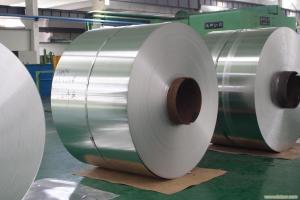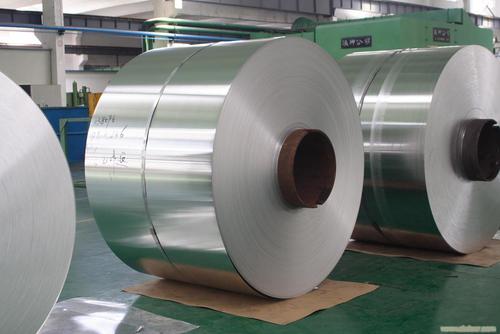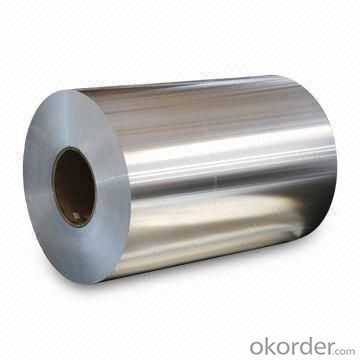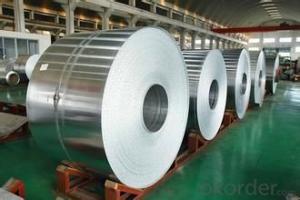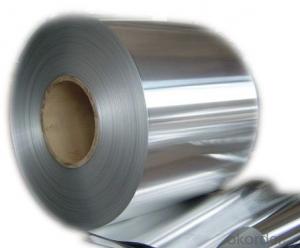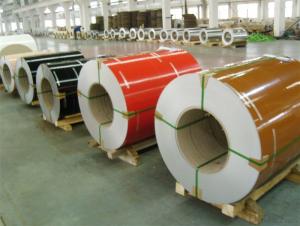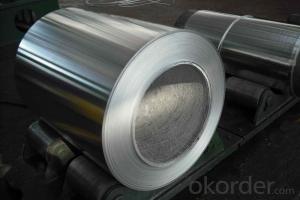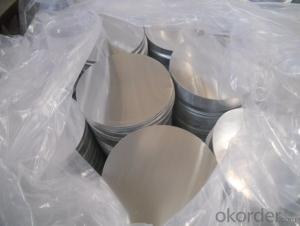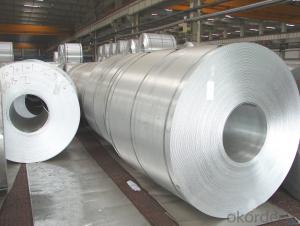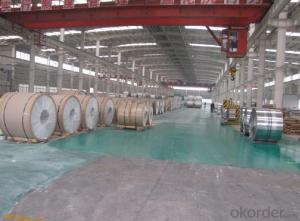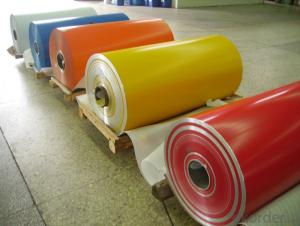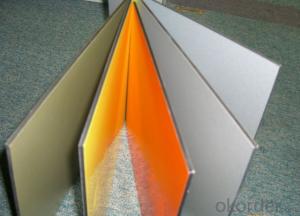Adp Aluminum Coil Cx360b635 Mill Finished Aluminum Sheets Foils Coils Circles
- Loading Port:
- Shanghai
- Payment Terms:
- TT or LC
- Min Order Qty:
- 5 m.t.
- Supply Capability:
- 9000 m.t./month
OKorder Service Pledge
OKorder Financial Service
You Might Also Like
Application: Foil stock, Circles, Roofing, Canstock, Marine plate,Anti-sliperypurpose in vehicles, packing and appliance.
Aluminium is a relatively soft, durable, lightweight, ductile and malleablemetal with appearance ranging from silvery to dull gray, depending on the surface roughness. It is nonmagnetic and does not easily ignite. A fresh film of aluminium serves as a good reflector (approximately 92%) of visible light and an excellent reflector (as much as 98%) of medium and far infrared radiation. The yield strength of pure aluminium is 7–11 MPa, while aluminium alloys have yield strengths ranging from 200 MPa to 600 MPa. Aluminium has about one-third the density and stiffness of steel. It is easily machined, cast, drawn and extruded.
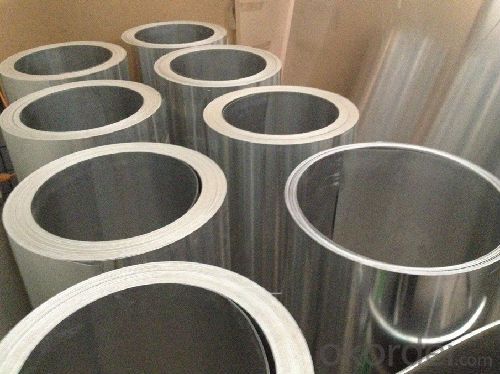
Alloy: AA1050, 1060, 1100, AA3003, 3005, 3015, 5052, 5754, 5083,8011,etc
Temper:H14/16/18/22/24/32,HO etc.
Thickness:0.2mm—100mm
Width:100mm—2300mm (Can be slitted)
Inner Diameter: 508MM
CoilWeight:500kg-3000kg(Max.)
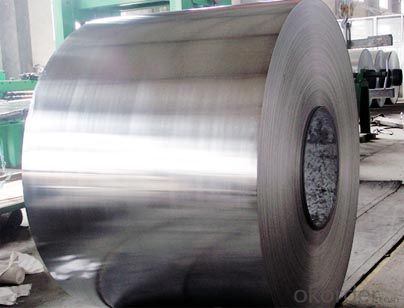
Surface Quality
1. There are no macular or roll marks on the surface of aluminum sheets.
2. There is no water corrosion on the surface.
3.The surface of aluminum sheets is very clean without lots of impurities.
An efficient quality control system is maintained and bears a documented quality assurance policy that is an approved quality assurance. It covers all our business activities like manufacturing, sales & service procedures. Under this system, we not only test the products but also check raw material.
Our quality assurance mechanism ensures that every product we manufacture passes through the following quality check stages:
Material control system
Process control system
Machining & dimensional control
Certification & supplementary test
Finishing & marking
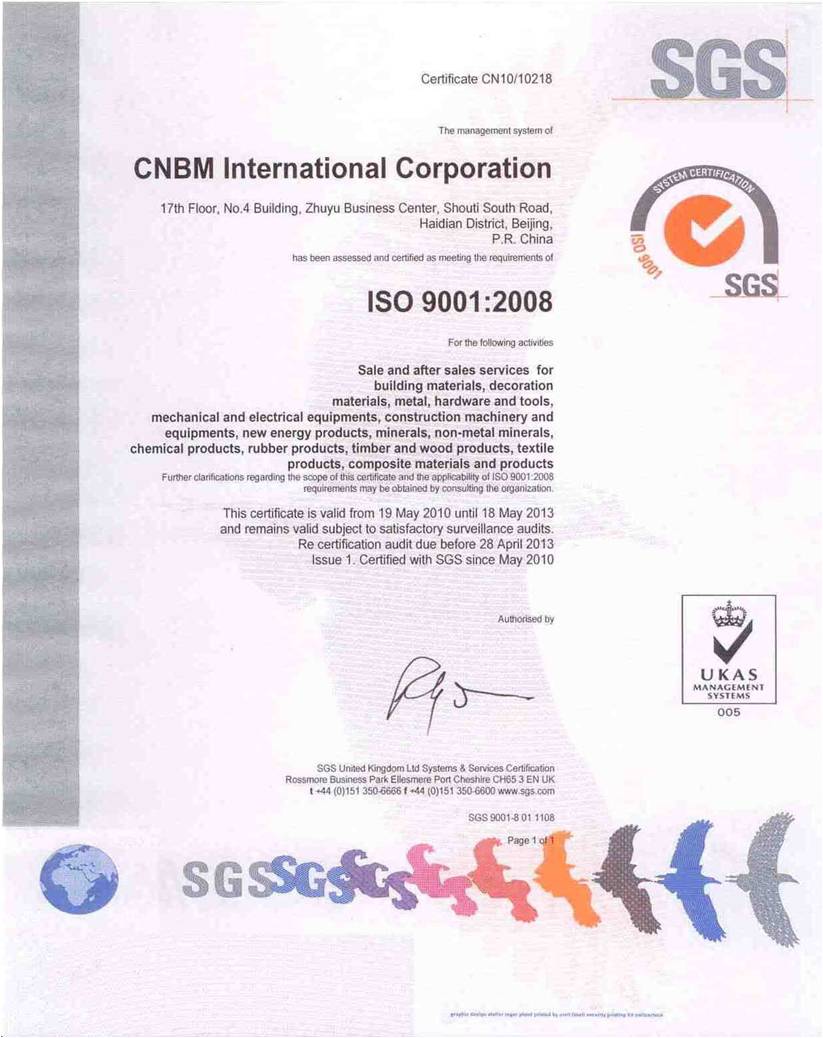
- Q: What are the potential applications of coil-perforated aluminum coils?
- Coil-perforated aluminum coils have a wide range of potential applications due to their unique properties and capabilities. Some of the potential applications of these coils are: 1. Architectural Applications: Coil-perforated aluminum coils can be used in architectural projects for facades, cladding, and sunscreens. The perforations allow for the creation of decorative patterns and designs, while also providing functional benefits such as ventilation and light control. 2. Industrial Applications: These coils can be used in various industrial applications such as filtration systems, soundproofing panels, and heat exchangers. The perforations in the aluminum coils allow for the passage of air, sound, and heat, making them suitable for these purposes. 3. Automotive Industry: Coil-perforated aluminum coils can be utilized in the automotive industry for applications such as radiator grilles, speaker covers, and air vents. The perforations in the coils provide functional benefits like airflow, sound transmission, and aesthetic appeal. 4. HVAC Systems: These coils can be employed in heating, ventilation, and air conditioning (HVAC) systems. The perforations in the aluminum coils allow for improved airflow, which helps in efficient temperature regulation and air distribution within buildings. 5. Acoustic Panels: Coil-perforated aluminum coils can be used in the construction of acoustic panels, which are designed to absorb and reduce sound reflections in spaces like auditoriums, theaters, and recording studios. The perforations in the coils aid in sound absorption and diffusion. 6. Lighting Fixtures: These coils can be incorporated into lighting fixtures to create unique lighting effects. The perforations in the aluminum coils allow light to pass through, resulting in visually appealing patterns and designs. 7. Furniture and Decorative Applications: Coil-perforated aluminum coils can be utilized in the manufacturing of furniture, screens, partitions, and decorative elements. The perforations in the coils add a distinctive aesthetic appeal and can create interesting visual effects. Overall, the potential applications of coil-perforated aluminum coils are diverse and encompass various industries, including architecture, automotive, industrial, HVAC, acoustic, lighting, and furniture. The unique properties of these coils, such as their lightweight, durability, and aesthetic customization options, make them a versatile choice for many different uses.
- Q: Are there any health or safety concerns related to aluminum coils?
- There are no significant health or safety concerns directly associated with aluminum coils. Aluminum is a common material used in various industries, including HVAC systems. It is lightweight, durable, and corrosion-resistant. However, it's important to ensure proper ventilation and avoid exposure to high concentrations of airborne aluminum dust or fumes, as excessive inhalation or ingestion might pose some health risks. Nonetheless, in typical applications, aluminum coils do not pose any significant health or safety concerns.
- Q: How do aluminum coils contribute to reduced maintenance costs?
- Primarily due to their exceptional durability and resistance to corrosion, aluminum coils contribute to reduced maintenance costs. Specifically designed to withstand harsh environmental conditions, including exposure to moisture, salt, and chemicals, aluminum coils differ from other metals like copper. This resistance to corrosion ensures that the coils remain intact and functional for extended periods, minimizing the need for frequent repairs or replacement. Moreover, aluminum coils are lightweight, making them easier to handle and install, thus reducing labor costs associated with maintenance activities. Additionally, their high thermal conductivity enables efficient heat transfer, resulting in increased energy efficiency and lower utility bills. Overall, the utilization of aluminum coils in HVAC systems assists in reducing maintenance expenses and extending the lifespan of the equipment, making them a cost-effective choice for both residential and commercial applications.
- Q: What can I get easily at Home Depot that will successfully bond rubber to aluminum?? I have tried several things with no success! Surely, there must be some sort of construction adhesive to do the job.Thanks!
- Go to an automotive parts store, like Pep Boys- they sell a gasket adhesive for rubber trim on cars that works very well- Also, there is an outstandingly strong spray adhesive called 3M-77 - buy it in the paint sections at Lowes( about $13.00 a can- but it is a big can!) Spray on the aluminum, spray on the rubber- let dry for about ten minutes and attach- Be careful- 77 is a one way adhesive- once it is stuck, no repositioning it- it's stuck for good! Do not wear latex or rubber gloves- they will stick, too- wear cheap cotton or jersey gloves while working with this kind of instant adhesive. BTW, be sure to clean the aluminum and rubber with solvent before applying the adhesive- any oil and the fix won't work.
- Q: What are the different coil pattern options for aluminum coils?
- Aluminum coils offer diverse coil pattern options to cater to specific applications and desired aesthetics. Here are some commonly used patterns: 1. Stucco Pattern: This option imitates the appearance of stucco with a textured, raised surface. It offers durability and a non-slip surface, making it suitable for outdoor surfaces and flooring. 2. Diamond Pattern: Featuring small diamond-shaped embossed designs, this pattern provides an attractive and slip-resistant surface. It finds applications in stair treads, walkways, and decorative panels. 3. Wood Grain Pattern: This pattern replicates the natural wood grain, making it an appealing choice for architectural and interior design purposes. It is commonly used in wall cladding, ceiling panels, and furniture. 4. Checkered Pattern: Also known as the checker plate pattern, it showcases a grid of raised diamonds or squares. This pattern offers excellent slip resistance and finds utility in safety-focused applications like ramps, industrial flooring, and staircases. 5. Plain Smooth Pattern: This versatile pattern has a flat, smooth surface without any embossed designs. It suits various applications such as roofing, gutters, and general fabrication. 6. Ribbed Pattern: Consisting of parallel lines or ribs along the coil's length, this pattern provides enhanced strength and rigidity. It is commonly used in truck bodies, trailers, and industrial equipment. These examples highlight the array of coil pattern options available for aluminum coils. The appropriate pattern selection depends on project-specific requirements, including functionality, durability, and aesthetic preferences.
- Q: Are aluminum coils suitable for food and beverage packaging?
- Yes, aluminum coils are highly suitable for food and beverage packaging. Aluminum is a safe and durable material that helps protect the quality and freshness of food and beverages. It is non-toxic, corrosion-resistant, and provides an effective barrier against moisture, oxygen, and light. Additionally, aluminum coils are lightweight, easily moldable, and can be easily shaped into various packaging formats, making it a popular choice for the food and beverage industry.
- Q: I'm ball milling aluminum into powder and I have filled the canister with some water to prevent the aluminum from igniting. The powder has begun to dissolve in the water. I'd like to know the best way to remove the dissolved aluminum from the water so I can get to the powder.There is around of cup of water in the canister, just to give an idea of the situation.
- Boil the water. The water will evaporate, leaving the aluminum behind.
- Q: How are aluminum coils tested for quality control?
- Aluminum coils undergo several tests during quality control to ensure their reliability and performance. One of the primary tests is the dimensional inspection, where the physical dimensions of the coils are measured and compared against the specifications provided by the manufacturer. This helps to identify any discrepancies in length, width, thickness, or diameter. Another crucial test is the visual inspection, where the coils are thoroughly examined for any surface defects such as scratches, dents, or discoloration. This visual examination is essential to ensure that the coils meet the required aesthetic standards. To evaluate the mechanical properties, various mechanical tests are conducted. Tensile strength tests are performed to measure the resistance of the aluminum coils to breaking under tension. This test helps in determining the durability and strength of the coils. Additionally, hardness tests are carried out to assess the coil's resistance to indentation or deformation. The hardness values are compared against the predetermined standards to verify if the coils meet the necessary criteria. Further tests include corrosion resistance testing, where the coils are exposed to harsh environments or corrosive substances to assess their ability to withstand corrosion over time. This test is crucial as aluminum is often used in applications where it may come into contact with corrosive elements. Electrical conductivity tests are conducted to ensure the proper functioning of the coils in electrical applications. The conductivity is measured and compared with the required specifications to guarantee that the coils possess the desired electrical characteristics. In addition to these tests, other factors like chemical composition analysis, surface roughness evaluation, and coating adhesion tests may also be performed depending on the specific requirements of the aluminum coils. Overall, through these comprehensive quality control tests, manufacturers can ensure that aluminum coils meet the necessary standards, guaranteeing their quality, performance, and reliability in various applications.
- Q: I am a college student living in a private apartment and I use up lots of aluminium foils to cook and eat. I use aluminium foils as plates because I am too lazy to clean plates. I want to know how environment-unfriendly i am for doing so. How bad am I compared to the guy who keeps on drinking from cans without recycling them?
- Aluminium foil is less than 0.2mm thick but typically 0.02mm so a piece 300mm x 100mm has a total volume of 3 x 1 x 2 x 10^2 mm^3 that is 600 mm^3 The density of Al is 2700 kg/m^3 so the mass of your foil is 2700 x 600 /10^9 kg = 0.00162 kg = 1.62 g Modern aluminium cans weigh about 15g I take it you aren't studying either physics or mathematics or you would easily have workd it out!
- Q: What are the different coil winding options available for aluminum coils?
- Aluminum coils offer several coil winding options to choose from. These options include: 1. Single-layer winding: This basic winding option involves winding the wire around the coil in a single layer. It is ideal for applications with limited space and the need for efficient cooling. 2. Double-layer winding: This option involves winding two layers of wire on top of each other. It provides improved heat dissipation and allows for higher power handling. 3. Concentric winding: With concentric winding, the wire is wound in concentric circles, each with a slightly different diameter. This type of winding reduces the overall size of the coil while maintaining high inductance. 4. Litz wire winding: Litz wire is composed of individually insulated strands. This winding option minimizes skin effect and reduces power loss due to high-frequency currents. It is commonly used in high-frequency applications. 5. Toroidal winding: Toroidal winding creates a circular shape for the wire, forming a toroidal coil. This type of winding offers better containment of the magnetic field and reduces electromagnetic interference. 6. Layered winding: Layered winding involves winding the wire in multiple insulated layers. It is used when a compact space requires a high number of turns. 7. Sectional winding: Sectional winding divides the coil into different sections and winds each section separately. This allows for better control over magnetic flux distribution and reduces losses. Each coil winding option has its own advantages and is suitable for different applications based on factors such as power handling capacity, size constraints, and frequency requirements.
Send your message to us
Adp Aluminum Coil Cx360b635 Mill Finished Aluminum Sheets Foils Coils Circles
- Loading Port:
- Shanghai
- Payment Terms:
- TT or LC
- Min Order Qty:
- 5 m.t.
- Supply Capability:
- 9000 m.t./month
OKorder Service Pledge
OKorder Financial Service
Similar products
Hot products
Hot Searches
Related keywords
